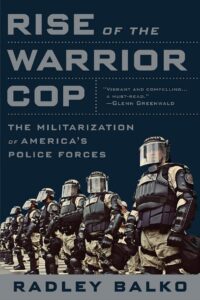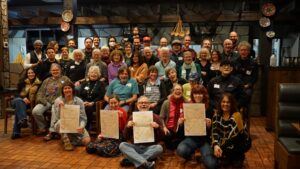by Radley Balko
A friend who grew up in Ballard in the 1950s told me of a time when as a kid he was caught letting the air out of the tires of a patrol car, while his buddies chatted with the local police officers who sat inside. Upon discovering the prank, the good-natured cops had the kids pile into the black and white cruiser and headed to a nearby gas station where they taught them all the basics of auto maintenance.

The idea of police being that positively engaged with the community seems Rockwellian and made me want to read Radley Balko’s new book, Rise of the Warrior Cop, to better understand whatever happened to “officer friendly”. How society addresses the creeping militarization of our local police is both timely as well as critical to advancing past what ails our country at the moment.
Balko reports on criminal justice and civil liberties for the Washington Post and he knows his stuff on this front. His writing is in depth, comprehensive, and yet quite readable, as he provides an exhaustive review of the slow but steady transformation of our local law enforcement from constable to commando.
Balko states at the outset that his book is not anti-cop and lays the blame firmly on our leaders who have over time moved our police in this dangerous direction to garner favor with voters. Politicians of all stripes have made a habit of whipping up fear about crime, only to smooth the way for more police state tactics to score political points and stay in power.
The courts have not helped by abdicating their role as a check on police power and sanctioning ever-more questionable tactics. SWAT teams; “No knock” forced-entry raids; stop & frisk; asset forfeiture and Homeland Security’s sale of military grade gear to small town America regardless of any real threat of terrorism, all make for a heavily armed force in every Mayberry in America, with a ‘Rambo’ world view.
Ever wonder why so many cops appear to be shooting defenseless citizens? For Balko, the answer lies in their training. He asserts such training has devolved over the years to an ‘us vs. them’ mentality akin to that of a soldier in a war zone, with a simple message that cops must be prepared to kill more readily to meet an ever-growing threat from the community. It’s no wonder that such inculcating, approved by law enforcement leadership, has led to even ‘good cops’ tending to shoot first and deescalate later.
Balko fails at times to highlight the institutional racism behind the policies that militarized the police. ‘Get tough on crime’ initiatives and the never-ending war on drugs mainly targeted the disadvantaged and mostly people of color. Add to this the inordinate use of traffic stops to cite poor folks for low level offenses that lead to stiff fines, fees and warrants when they can’t be paid, and the police have become an effective tool for one class tormenting the other.
Balko’s work is a thoughtful description of a long and tragic descent, starting with the social upheaval of the 1960’s and ending with the sorry situation we have today: misguided policies leading to an ever-increasingly imbalanced and overreactive approach to policing that ignores civil rights and serves to victimize the underclass.
All branches of government have contributed to the problem, so we’re left with protests in the streets to try to address the obvious growing cop cancer. Sadly, and ironically, this has only been used to further raise the specter of lawlessness and harden partisan lines.
Trent is a freelance writer who grew up in Olympia.

Be First to Comment